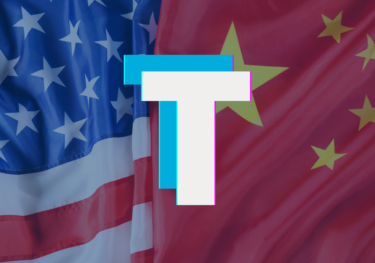Techonomics Talks | 01 Dec 2023
The cost of US-China decoupling

David Schockenhoff
Head of US Macro Consulting

Trade protectionism between the US and China has been intensifying over recent years, and this is increasingly raising concerns of an adverse economic fallout among businesses.
In our latest Techonomics Talks, David Schockenhoff, Head of US Macro Consulting, examines these concerns and the potential economic fallout.
Click here to check out previous Techonomics Talks episodes.
Trade protectionism between the US and China has been intensifying over recent years, and this is increasingly raising concerns of an adverse economic fallout among businesses, in particular in the United States. So what do the numbers tell us? US imports of Chinese goods affected by the Trump tariffs have dropped 30% since 2018. And assuming trade would have followed its previous trend.
We estimate that in 2023, those sectors are importing around 40 to 50% less from China than they could have been in the absence from tariffs. Investment is another area where US-China decoupling has become evident. With bilateral FDI flows hitting multi-year lows last year, overall, we estimate that Trump tariffs are associated with 245,000 lost jobs and 100 billion US dollar lost output for the US economy during the 2018-19 period.
Now, over the past year, the rhetoric among US policymakers has become even more hawkish. Several semiconductor export bans have been imposed, prohibiting U.S. exports of advanced chips to China. On top of that, the Trump tariffs are up for review this year.
The key question is how could all of this impact the US economy? In a recent study, Oxford Economics estimates the economic impact from one possible scenario where tariffs on imports from China are raised from currently 19% to 61%, followed by a likely retaliation from China.
We find that this could cost the US around 800,000 jobs and 1.6% of its total output by 2025, mostly driven by higher prices and a fall in financial markets, which would push down demand. In general, we find that consumer facing service sectors would be badly hit because higher prices and reduced incomes mean households have to cut back on spending.
However, the worst hit sectors in our scenario would be transport and machinery related manufacturing sectors that are particularly reliant on inputs from China. Given the complexity of global supply chains and the importance of both China and the US for the global economy, decoupling and indeed a potential structural trend towards deglobalization are issues that will surely remain a key risk for the foreseeable future.
How can we help you?
Oxford Economics offers comprehensive data-driven insights and consulting services that empower both tech companies and their customers to make strategic decisions in today’s dynamic market. With a foundation in economics, we enable you to grasp technology’s impact, understand market shifts, and navigate external influences effectively. Whether quantifying risks, identifying growth opportunities, or becoming a thought leader, Oxford Economics equips you to not only meet stakeholder expectations but also exceed them, fostering growth and bolstering reputation. Our data-driven approach ensures that every decision is well-informed, turning challenges into steppingstones for innovation and success in an ever-evolving landscape.
Sign up now for technology insights straight to your inbox or request a call back to discuss how we can help you.

The Economic Impact of China PNTR Repeal
As scepticism towards China is rising among policymakers, businesses grow more concerned about the potential economic fallout from an escalation in US-China tariff policy.
Tags:
